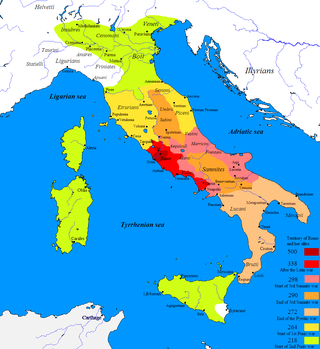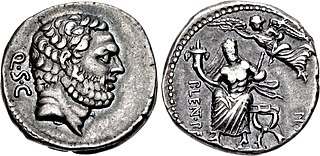Related Research Articles
Year 48 BC was a year of the pre-Julian Roman calendar. At the time, it was known as the Year of the Consulship of Caesar and Vatia. The denomination 48 BC for this year has been used since the early medieval period, when the Anno Domini calendar era became the prevalent method in Europe for naming years.

This article concerns the period 49 BC – 40 BC.
Publius Cornelius Dolabella was a Roman politician and general under the dictator Julius Caesar. He was by far the most important of the patrician Cornelii Dolabellae but he arranged for himself to be adopted into the plebeian Cornelii Lentuli so that he could become a plebeian tribune. He married Cicero's daughter, Tullia, although he frequently engaged in extramarital affairs. Throughout his life he was an extreme profligate, something that Plutarch wrote reflected ill upon his patron Julius Caesar.

The First, Second, and Third Samnite Wars were fought between the Roman Republic and the Samnites, who lived on a stretch of the Apennine Mountains south of Rome and north of the Lucanian tribe.
The gens Baebia was a plebeian family at ancient Rome. The first member of the gens who obtained the consulship was Gnaeus Baebius Tamphilus, in 182 BC. During the later Republic, the Baebii were frequently connected with the patrician family of the Aemilii.

Publius Cornelius Lentulus Spinther was a Roman politician and general. Hailing from the patrician family of the Cornelii, he helped suppress the Catilinarian conspiracy during his term as curule aedile in 63 BC and later served as consul in 57 BC. Denied the opportunity to invade Egypt the following year, he nevertheless won some victories in his province of Cilicia and celebrated a triumph over it in 51 BC.
Publius Cornelius Lentulus Sura was one of the chief figures in the Catilinarian conspiracy. He was also the step-father of the future triumvir Mark Antony.
Lucius Cornelius Lentulus Crus was Consul of the Roman Republic in 49 BC, an opponent of Caesar and supporter of Pompeius in the Civil War during 49 to 48 BC.
Gnaeus Cornelius Lentulus Vatia was the Roman owner of a gladiatorial school in ancient Capua. It was from this school that, in 73 BC, the Thracian slave Spartacus and about 70 to 78 followers escaped. The breakout led to the slave rebellion known as the Third Servile War.

The gens Cornelia was one of the greatest patrician houses at ancient Rome. For more than seven hundred years, from the early decades of the Republic to the third century AD, the Cornelii produced more eminent statesmen and generals than any other gens. At least seventy-five consuls under the Republic were members of this family, beginning with Servius Cornelius Maluginensis in 485 BC. Together with the Aemilii, Claudii, Fabii, Manlii, and Valerii, the Cornelii were almost certainly numbered among the gentes maiores, the most important and powerful families of Rome, who for centuries dominated the Republican magistracies. All of the major branches of the Cornelian gens were patrician, but there were also plebeian Cornelii, at least some of whom were descended from freedmen.

Aurelia was the mother of the Roman general and statesman Julius Caesar.
Gnaeus Cornelius Lentulus was a consul of the Roman Republic in 146 BC. His colleague was Lucius Mummius Achaicus, whose military achievements outshone him.
Servius Cornelius Lentulus Maluginensis was a Roman statesman, who flourished during the reigns of Augustus and Tiberius. He was flamen dialis, and consul suffectus in AD 10.
The gens Apronia was a plebeian family at ancient Rome throughout the history of the Republic and into imperial times. The first member of the gens to achieve prominence was Gaius Apronius, tribune of the plebs in 449 BC. None of the Apronii obtained the consulship until the first century AD.
The gens Apustia was a plebeian family at Rome during the period of the Republic. The first member of this gens who obtained the consulship was Lucius Apustius Fullo, in 226 BC.
Gaius Calvisius Sabinus was a Roman Senator, who was consul in AD 26 as the colleague of Gnaeus Cornelius Lentulus Gaetulicus. During the reign of Caligula, he was accused of conspiring against the emperor, and took his own life rather than submit to a trial.
Publius Cornelius Lentulus Caudinus was a Roman politician in the third century BC.